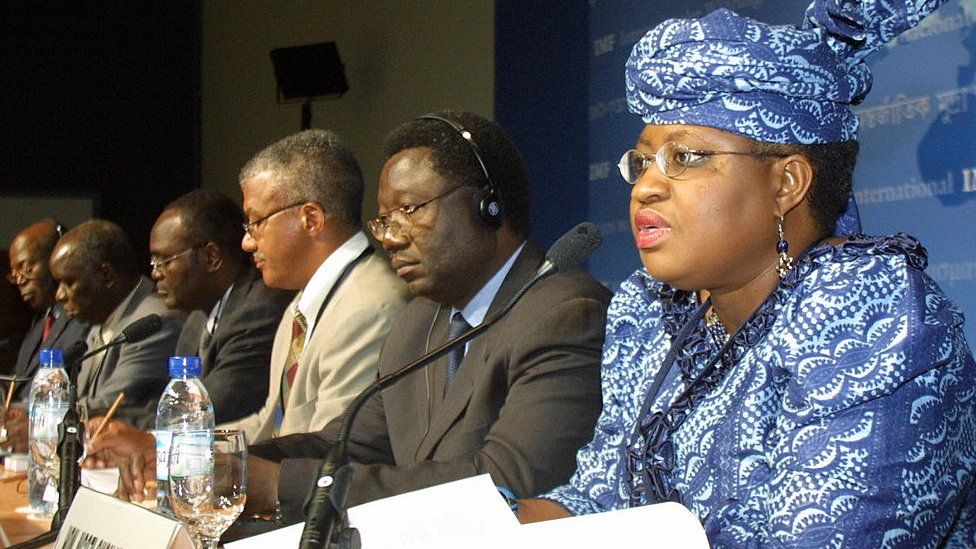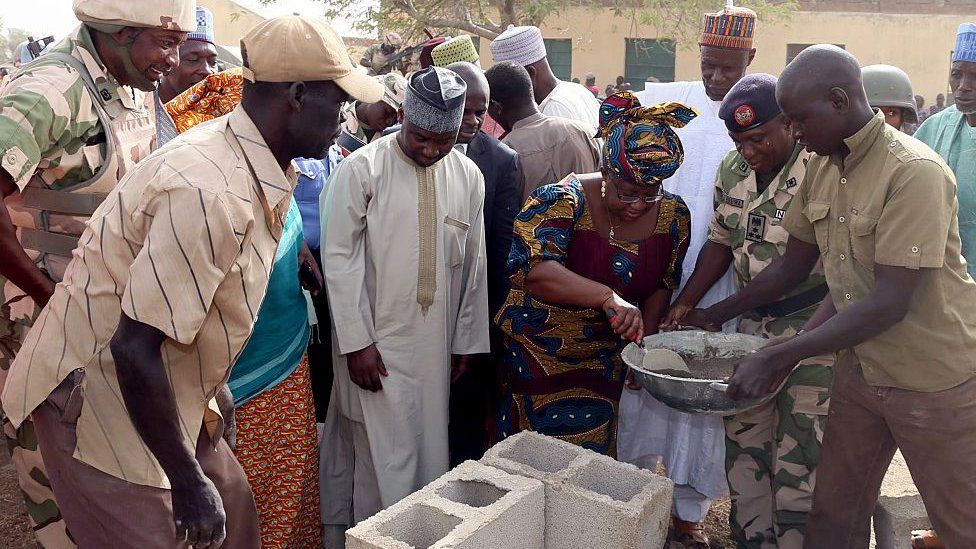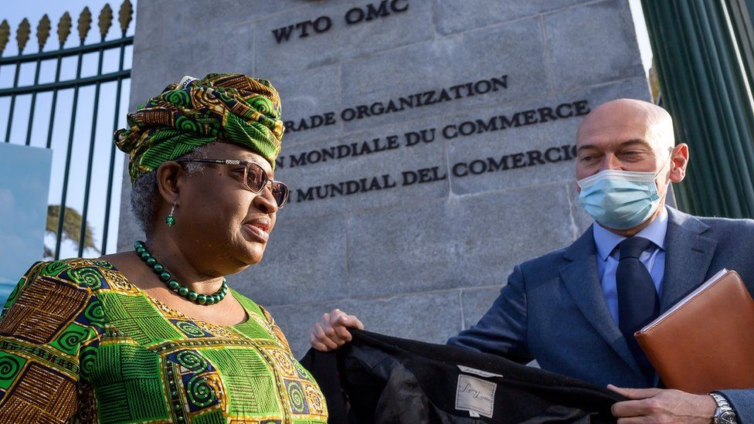Having survived the murky waters of politics in Nigeria, where her mother was kidnapped to send her a message, and rising to number two at the World Bank, Ngozi Okonjo-Iweala should have no trouble dealing with international trade negotiators in her new job at the World Trade Organisation (WTO).
The 66-year-old is the first woman, and the first African, to occupy the position.
Despite recently taking out US citizenship, she revels in being Nigerian and is fiercely patriotic - flaunting her African identity in her African-print tailored outfits.
She told the BBC in 2012 that she had in fact adopted such attire as a working mother of four to do the school run, an easy answer for a smart look - and a thrifty one at that, given she estimated each outfit cost around $25.
The Harvard-educated development economist is seen as a down-to-earth, hard worker, who told BBC HardTalk in July that what the WTO needed was a shake-up.
"They need something different, it cannot be business as usual for the WTO - [they need] someone willing to do the reforms and lead."
Reform in Nigeria
During her 25 years at the World Bank, she is credited with spearheading several initiatives to assist low-income countries, in particular raising nearly $50bn in 2010 from donors for the International Development Association (IDA), the World Bank's fund for the poorest countries.
But it is her reform agenda in Nigeria in which she takes real pride - especially the two times she served as the country's finance minister under Presidents Olusegun Obasanjo and Goodluck Jonathan.

One of her greatest achievements was leading a team which negotiated a whopping $18bn debt write-off in 2005 for the country, helping Nigeria obtain its first ever sovereign debt rating.
The country's debts had dated back to the early 1980s, and had ballooned to more than $35bn due to penalties and late fees during the 1990s.
Her economic reforms had a far-reaching impact and saved Nigeria at a critical period, according to prominent Nigerian economist, Bismarck Rewane.
This included de-linking the budget from the oil price, allowing the country to save money in a special account when oil prices were high.
"It was this buffer that ensured Nigeria's economy survived between 2008 and 2009," Mr Rewane told the BBC.
Ms Okonjo-Iweala had given up a well-paid job at the World Bank and left her family in Washington, where her husband works as a neurosurgeon, to work in Nigeria, where unlike other ministers she did not have a large domestic staff or fleet of cars.
In fact she even liked doing her own cooking when she could, with cow-tail pepper soup being a favourite, a Financial Times interview revealed in 2015.
No-nonsense approach
But her reforms and especially her crackdown on corruption in the fuel sector, where some powerful importers - known as marketers - claimed huge sums of money in subsidies from the government for fuel they had not sold, came at great personal cost.
Her mother, Kamene Okonjo - a medical doctor and retired professor of sociology - was kidnapped from her home in southern Nigeria in 2012, aged 82.
Kidnapping is common in Nigeria, where it is a lucrative criminal enterprise and families often pay up as the security services do not often find those abducted.
The then-finance minister said the kidnappers had first demanded her resignation and then a ransom.

This determination and independence helped her as she took on other reforms in Nigeria - like her decision to reveal the amount of money allocated monthly to local authorities for things like the construction of roads and the running of rural schools and clinics.
Economist Pat Utomi said Nigerians had not realised how much regional administrators were receiving.
"But she came up with the idea of publishing them and basically embarrassed a lot of people," Prof Utomi told me.
She also introduced a system that helped to remove thousands of fake workers and pensioners from government payroll.
But when the government decided to remove a fuel subsidy in 2012, things did not go well.
Ms Okonjo-Iweala said the subsidy was unsustainable as it was costing $8bn a year, and encouraged corruption.
However, the government was forced to back down after nationwide protests - the subsidy was only removed earlier this year, with the government promising to keep the price capped.
And some believe while her reforms in Nigeria were good, they have not been long-lasting.
'Like running a household'
Nigerian women's activist Josephine Effa-Chukwuma says Ms Okonjo-Iweala's career is so much more impressive given how little respect women can be shown in Nigeria.
"She made women proud that a woman in a patriarchal and misogynistic country like Nigeria could hold her own and perform creditably contrary to what detractors thought," she told the BBC
"She was honest, transparent and accountable - virtues not often found in public office-holders in Nigeria."
The economist, who also serves on Twitter's board of directors, as chair of the Gavi vaccine alliance and as a special envoy for the World Health Organization's Covid-19 fight, has joked before that women seem to be less corrupt.
"Women tend to be more honest, more straightforward, more focused on the job, and bring less ego to it. I don't know if it's a feminine instinct but running an economy is sometimes akin to running a household," she told the Independent in 2006.
And women are also on her agenda at the WTO.
In her job application, she said: "It should also be responsive to the challenge of facilitating the greater participation of women in international trade, particularly in developing countries, where greater efforts should be made to include women owned enterprises in the formal sector."
Ms Effa-Chukwuma says this all bodes well for the WTO: "We trust her to deliver on the job and ensure that developing countries benefit from international trade."
Latest Stories
-
“This is not a witch-hunt” – Keta MCE urges calm as probe into reclaimed lands begins
3 minutes -
Ghana’s cedi appreciation: Causes, consequences, and policy imperatives
5 minutes -
Robert Klah apologises to Felicia Osei over TGMA ticket issues
7 minutes -
Speak Up Africa galvanises private sector engagement to accelerate malaria-elimination efforts in Africa
18 minutes -
Power crisis: We need $1.1bn to procure liquid fuel alone – Energy Minister
38 minutes -
26Tth TGMA: Spectacle, sound, soul and a sprinkle of chaos
40 minutes -
Railway strike hits vendors hard as livelihoods hang in the balance
1 hour -
GACC calls for collective action to tackle corruption in Ghana
1 hour -
Fare Thee Well “The Bulldozer” Of Ghana Football
1 hour -
Belief vs. Redemption: The Women’s FA Cup Final showdown
1 hour -
Non-traditional export dips by 2.87% in 2024 — GEPA
1 hour -
I was high on marijuana the first time I entered church – Archbishop Agyinasare shares salvation story
1 hour -
Ag. NPA CEO engages tanker drivers in Western Region, unveils measures to address industry challenges
1 hour -
Don’t take for granted what Ghanaians did for you – Archbishop Agyinasare advises Mahama
2 hours -
Gov’t pushes for private sector role in power distribution to boost revenue efficiency
2 hours

